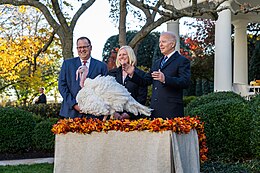Carnism
[1][2][3][4] The term carnism was coined by social psychologist and author Melanie Joy in 2001 and popularized by her book Why We Love Dogs, Eat Pigs, and Wear Cows (2009).[1] Analyzing the history of vegetarianism and opposition to it from ancient Greece to the present day, literary scholar Renan Larue found certain commonalities in what he described as carnist arguments.[15] Joy compares carnism to patriarchy, arguing that both are dominant normative ideologies that go unrecognized because of their ubiquity:[1] We don't see meat eating as we do vegetarianism – as a choice, based on a set of assumptions about animals, our world, and ourselves.[5]Sandra Mahlke argues that carnism is the "central crux of speciesism" because the eating of meat motivates ideological justification for other forms of animal exploitation.Dogs are eaten in China, and South Korea, but elsewhere are not viewed as food, either because they are loved or, as in the Middle East and parts of India, regarded as unclean.argue that these taxonomies determine how the animals within them are treated, influence subjective perceptions of their sentience and intelligence, and reduce or increase empathy and moral concern for them.[36] Opinion pieces in The Huffington Post, The Statesman, and The Drum praised the idea, saying the term made it easier to discuss, and challenge, the practices of animal exploitation.[39][40][41] An article in the beef industry outlet Drovers Cattle Network criticized the use of the term, saying it implied that eating animal foods was a "psychological sickness".

Joshua Nortonstreet dogsBummer and LazarusMelanie JoyAnthrozoologyethics of eating meatpsychology of eating meatspeciesismveganismvegetarianismAnimal rightsAnimal welfareAround the worldHistoryTimelineAnimal crueltyPrimate rightsin researchMovementAdvocatesVegansVegetariansGroupsAnimal–industrial complexKillingMutilationWild animalsConsumptionHorsesCattleBloodsportsBullfightingHuntingFishingCosmeticCaptivityCompanion animalsPuppy millsAbandonmentAnimal ethicsAbolitionismAnimal protectionismPersonismSentientismCultured meatEnvironmentalismRadicalDeep ecologyHumanismWelfarismideologyanimal productsdefense mechanismsWhy We Love Dogs, Eat Pigs, and Wear CowscrueltyprotectedAnimal industrial complexHistory of vegetarianismRenan LaruePorphyryRichard RyderspeciespatriarchyAbolitionistGary FrancionepropertyVrindavanrevereddog-meatverminschemataempathycognitive dissonancepsychic numbingmeat consumptionomnivoressocial inequalityconsumer choicesNational Thanksgiving Turkey PresentationCharlotte's WebSy MontgomeryTamworth TwoEmily the CowCincinnati Freedompoultry industryThe Huffington PostThe StatesmanThe DrumFood studiesMoral psychologyNon-vegetarianismTaboo food and drinkList of vegan mediaDesaulniers, ÉliseCenter for Global NonkillingJoy, MelanieSchott, BenRyder, Richard D.Marc BekoffDiamond, CoraCass SunsteinMartha NussbaumNBC NewsBibcodeGoodyer, PaulaTEDx talkAnimal rights movementAnimal rights by country or territoryAnarchism and animal rightsAnimal rights and punk subcultureAnimal cruelty–Holocaust analogiesAnimal rights in Indian religionsChristianity and animal rightsHistory of animal rightsList of international animal welfare conventionsMoral status of animals in the ancient worldTimeline of animal welfare and rightsTotal liberationUniversal Declaration on Animal WelfareAhimsaAnimal cognitionAnimal consciousnessAnimal lawAnimal-free agricultureArgument from marginal casesCambridge Declaration on Consciousness